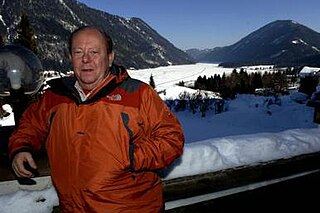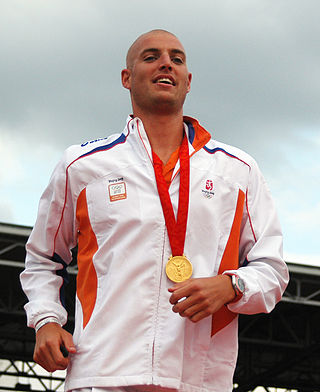
Speed skating is a competitive form of ice skating in which the competitors race each other in travelling a certain distance on skates. Types of speed skating are long-track speed skating, short-track speed skating, and marathon speed skating. In the Olympic Games, long-track speed skating is usually referred to as just "speed skating", while short-track speed skating is known as "short track". The International Skating Union (ISU), the governing body of competitive ice sports, refers to long track as "speed skating" and short track as "short track skating". Long track speed skating takes place on a 400m ice track, while short track takes place on a 111m track.

Grietje "Greta" Smit is a Dutch former speed skater.

The Elfstedentocht is a long-distance tour skating event on natural ice, almost 200 kilometres (120 mi) long, which is held both as a speed skating competition and a leisure tour. The Elfstedentocht is the biggest ice-skating tour in the world.

Ter Aar is a town and former municipality in the western Netherlands, in the province of South Holland. It is located about 6 km northeast of Alphen aan den Rijn. The town had a population of 9,007 on 1 July 2006.

An ice rink is a frozen body of water or an artificial sheet of ice where people can ice skate or play winter sports. Ice rinks are also used for exhibitions, contests and ice shows. The growth and increasing popularity of ice skating during the 1800s marked a rise in the deliberate construction of ice rinks in numerous areas of the world.

Long-track speed skating, usually simply referred to as speed skating, is the Olympic discipline of speed skating where competitors are timed while crossing a set distance. It is also a sport for leisure. Sports such as ice skating marathon, short-track speedskating, inline speedskating, and quad speed skating are also called speed skating.

Pieter "Piet" Kleine is a former speed skater from the Netherlands who specialized in the longer distances.

Hilbert van der Duim is a Dutch former speed skater. A two-time world and European champion, Van der Duim "won often but also fell often", and has become famous for some of the incidents that happened to him during his career.

Henk Angenent is a retired Dutch speed skater, specialising in marathon skating and the longer distances. Angenent won the Elfstedentocht on 4 January 1997, outsprinting favourite Erik Hulzebosch at the finish.
Jan Maarten Heideman is a Dutch speed skater who specialises in marathon speed skating.
Daniëlle Bekkering is a Dutch marathon speed skater, short track speed skater, and cyclist who currently lives in Den Ham (Groningen). Bekkering has several nicknames like Beeks, Daantje and Dikkie Dik. Her sister Eyelien is also a cyclist.

Aart Koopmans was a Dutch business man, president of the Dutch winter speed skating marathon organisation and founder of the Alternative Elfstedentocht. His father, Bram Koopmans was the organiser for the Amstel Gold Race in road bicycle racing for many years.

Elma de Vries is a Dutch marathon speed skater and inline speed skater. She is the older sister of marathon speed skater Bob de Vries.
Erik Hulzebosch is a Dutch marathon speed skater, inline speed skater and part-time singer and blogger at his own website.

Maarten van der Weijden is a Dutch long distance and marathon swimmer born in Alkmaar. In 2019 Van der Weijden swam the Elfstedentocht for charity. He raised more than €6.1 million.

Yep Kramer is a Dutch-Frisian long track and marathon speed skater. He is the father of speed skaters Sven Kramer and Brecht Kramer.

Jacob Jorrit Bergsma is a Dutch speed skater and marathon skater. At the 2014 Winter Olympics, he won the gold medal in the 10,000 m. His coach is Jillert Anema.

The Dutch Marathon Championships is a speed skating event composed of two championships. One on natural ice and one on artificial ice.

Jeen van den Berg was a Dutch long track speed skating athlete primarily known as the winner of the Elfstedentocht of 1954. He competed in the race a record seven times, with his first race being in 1947 and his final one in 1997.
Ice skating marathons are long distance speed skating races which may be held on natural ice on canals, and bodies of water such as lakes and rivers. Marathon is a discipline of speed skating, which is founded in The Netherlands. The races concern speed skating by at least five skaters who start all together on an ice rink with a minimum length of 333.33 meters or on a track:
















